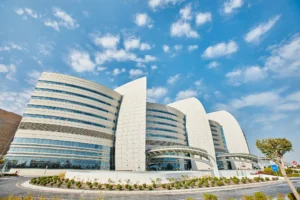As waiting times rise for weight loss surgery on Britain’s national “free at the point of use” healthcare system, the NHS, more people are looking overseas for treatment. But recent cases of post-operative complications back home sound the alarm over cut-price care.
One 24 year old patient from Swansea, Wales visited Istanbul for a sleeve gastrectomy. Six days after the operation she experienced pain and fever. She spent four months in hospital.
Swansea consultant surgeon Andrew Beamish said he was seeing a worrying number of patients with complications after treatment overseas. “Many people, especially those on lower incomes, are going abroad,” he said. “The surgery is similar to that done in the UK, but pre and post-operation care is the problem, with people often staying in a hotel for a couple of nights after surgery before flying home. For this type of treatment, you need the support of psychologists and specialist dieticians as you will be eating completely different types and amounts of food.”
High costs and long waits
The Welsh institute of metabolic and obesity surgery in Morriston Hospital, Swansea, is the only centre in Wales that provides weight loss surgery. If this is paid for privately it will cost in excess of £12,000 but can be done in other countries starting from £3,000.
Wales, with a population of 3.2 million, has 750,000 people waiting for treatment on the NHS. More than a quarter of those, 180,000, have been waiting for more than a year.
The two most common types of weight loss surgery are sleeve gastrectomy, where some of the stomach is removed, gastric bypass, where the top part of the stomach is joined to the small intestine, or gastric band, where a band is used to reduce the size of the stomach. In each case, a smaller amount of food will make the patient feel full after surgery.
Andrew de Beaux, an Edinburgh consultant surgeon, has seen numbers of patients seeking help after problems with weight loss surgery overseas. He said: “People are risking their lives for a goal of losing weight. My NHS Lothian health board saw 33 urgent referrals last year for people who had received weight loss surgery overseas and something had gone wrong.”
Midlothian GP Dr Becky Harley has seen an increasing number of patients seeking nutritional and psychological advice after returning from surgery overseas.
She said: “When people have these surgeries done through the NHS, they will be followed up by the team in the hospital, usually for a couple of years, and in that time they will have specialist input. When patients get this surgery abroad, often there is just not that follow-up and that can be dangerous.”
Complications and after-care
A 2020 study of 36,000 operations done in the NHS over a five year period found that there were post-surgery complications in around 800 patients, or 2.4%. The aftercare needed after weight loss surgery is intensive and can involve special diets of easily digestible food.
WLS info is a UK charity dedicated to providing unbiased advice on Weight Loss Surgery (WLS) and also non-surgical treatments for obesity. Gastric surgeon Professor Conor McGee on the WLS info web site advises that the key to successful bariatric surgery is choosing the right “team”. He says “The patient’s journey doesn’t start in the operating theatre; it starts with the assessment by surgeon, anaesthetist, dietician, and specialist nurse. The Multi-Disciplinary Team (MDT) provides your care from the assessment onwards.”
He advises caution about seeking surgery abroad because post-operative follow-up is essential. “Many patients see surgery as a one-stop cure; they have their operation and believe everything will be all right. But if you are not followed-up then problems can and will occur.”
Questions to ask if going abroad
Although many people are tempted to seek treatment abroad because of the lower cost, there are also patients who choose to go abroad for quality reasons. Some markets such as the UAE have a similar price point to the UK but attract top bariatric surgeons from many countries worldwide.
Patients going overseas should consider whether they are getting a full support package. Questions they should ask include: “What is your approach to managing complications? How many times will I be seen in the first 1-2 years?”
In order to ensure they get the best surgery, patients should look at the background of both the institution or clinic where the work takes place, and the individual surgeon. Accreditation and quality control vary widely from one country to another. There is no worldwide standard of care. However, a number of bodies including The Joint Commission International (JCI), Trent International Accreditation Scheme (U.K.), the International Society for Quality in Healthcare, and the International Bariatric Surgical Review Committee (IBSRC) have responded to the growth in medical travel by establishing accreditation procedures for international medical facilities.
The American Society for Metabolic and Bariatric Surgery advises that long-term success in bariatric surgery depends on lifelong compliance with dietary habits, nutritional guidelines and exercise as part of a multi-disciplinary bariatric program. Recommendations and testimonials from other patients can also be helpful but should be used in addition to checking credentials.
Planning ahead
If it is not practicable for the patient to travel back to the place of surgery for follow-up, they should establish a plan for postoperative follow-up back in their home country before undergoing surgery. For this to be effective, they must ensure all medical records and documentation are provided and returned with the patient to their home country. This should include the type of band placed and any adjustments performed in the case of adjustable gastric banding, as well as any postoperative imaging performed. Insurance coverage for complications or follow-up after surgery abroad should also be verified.
Travel after gastric surgery can often be difficult or uncomfortable and increases the risk of certain complications such as deep venous thrombosis. It is therefore important that sufficient time is allowed to recover after surgery, close to the clinic where the operation was carried out.














